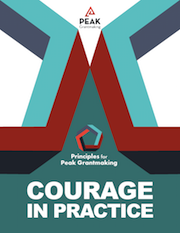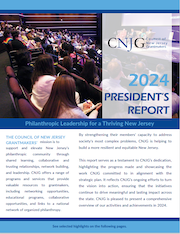Site Search
- resource provided by the Forum Network Knowledgebase.
Search Tip: Search with " " to find exact matches.
From the Commonfund, these white papers on investment policy statements, spending policy, board governance and risk tolerance, together with their most recent studies of investments at private and community foundations, operating charities and nonprofit healthcare organizations are made available though CNJG's Investment Forum for Foundations and Endowments.
Today, the practice of CSR has matured to include strategic philanthropy, employee volunteerism, cause marketing, disaster response, peer-to-peer fundraising, nonprofit board service, and even incorporating social responsibility into core business practices and offerings. Within the pages of this ebook, you’ll hear from leaders who have successfully charted a course for each of these areas to play a role in the new world of CSR.
Nonprofit Finance Fund's Annual Survey chronicles the challenges facing the nonprofit sector and calls out some of the targeted investments we can start to agree on as a society to salvage the investment we have collectively made in our social infrastructure. We believe that a coordinated intervention now will not only better prepare us for inevitable future economic crises; it can lead to a happier, healthier community for us all.

Summer always brings to mind those great “summer reads.” This has been an “occasional series” of CNJG eNews during the summer, over the years. In addition to this year’s curated list – I’m thrilled to share recommendations from a few CNJG Board members and the CNJG team!
CNJG Board of Trustees’ Secretary, Maisha Simmons, Robert Wood Johnson Foundation, recommends Heather McGhee’s The Sum of Us: What Racism Costs Everyone and How we can Prosper Together. There’s also a podcast series, and the book has been adapted for young readers.
The Work: My Search for a Life that Matters by Wes Moore is the top pick from Board member, Jasmyne Beckford, The Prudential Foundation. Jasmyne reflects, this book helped her think about how she can live a life that creates impact for generations both personally and professionally.
CNJG Board member Justin Kiczek, F. M. Kirby Foundation, recently read Getting Beyond Better: How Social Entrepreneurship Works. “As our foundation holds both stewardship and entrepreneurship as core values, it helps me understand how social entrepreneurs start their journey and scale their solutions.”
In honor of Black Philanthropy Month this August, I’m excited to feature a few great reads created to inspire and inform your philanthropic journey. Thank you to Manager of Communications Shakirat Odunsi for curating this list:
- Madam C. J. Walker's Gospel of Giving: Black Women's Philanthropy during Jim Crow highlights Walker’s visionary approach to philanthropy and community-building, emphasizing the vital role of Black women’s giving in advancing social justice. Freeman’s work sheds light on how Walker’s philanthropy was an extension of her entrepreneurial spirit and commitment to racial and gender equality.
- Ford Foundation’s Darren Walker reimagines Andrew Carnegie’s vision of philanthropy for the modern era in From Generosity to Justice: A New Gospel of Wealth, urging philanthropists to go beyond charity and address systemic inequalities to foster justice and lasting change.
- Emergent Strategy: Shaping Change, Changing Worlds encourages readers to embrace adaptability and resilience by using emergent strategies – small-scale actions that create large-scale impact. Author adrienne maree brown challenges traditional models of organizing and invites us to envision a more just and equitable world through collaboration, creativity, and deep connections with others. It’s a guidebook for those seeking to shape the future and navigate the complexities of change.
- Isabel Wilkerson explores how entrenched hierarchies based on race and class impact every aspect of our lives in Caste: The Origins of Our Discontents. Through compelling narratives and meticulous research, she reveals how this hidden system continues to perpetuate inequality and injustice, challenging us to confront these deeply rooted structures and work toward true equality.
From the CNJG team, Director of Member Services Craig Weinrich is currently reading How We Give Now: A Philanthropic Guide for the Rest of Us by Lucy Bernholz. This book demonstrates that philanthropy is about much more than money. Bernholz posits that even giving our data willingly to companies is an act of philanthropy. This is a great intersection to the Spring Colloquium conversation around AI, and ongoing discussions about how we can expand our definition of philanthropy as guided by our Strategic Plan.
Chanika Svetvilas, Manager of Programs and Learning recommends Against Technoableism by Ashley Shew and Imagination A Manifesto by Ruha Benjamin. Not too long ago I read Four Thousand Weeks: Time Management for Mortals, which prompted me to really consider what each of us should focus on in our day-to-day work, and what we need to let go. It’s a practical, insightful guide that led to several “aha” moments. All three books challenge us to think very differently about our world and what’s possible.
And finally, a recently discovered read I’ve gifted to family and friends, All the Colors of Life by renowned artist Lisa Aisato; this will lift your spirits as you find yourself paging through it and experiencing it over and over again.

Happy Summer Reading!
On a different note, I hope you will join us at the Summer Joint Policy Forum – Nonprofit and Philanthropic Champions for New Jersey on August 13, at The Heldrich in New Brunswick. I look forward to seeing you there, and hearing what’s on your summer reading list!
Sincerely,
Theresa Jacks, President and CEO
Council of New Jersey Grantmakers
CNJG’s Finance and Investment Affinity Group exists to keep foundation executives informed as they manage the investment of their corpus. Growth of foundation assets and the active exchange of sound investment strategies is the focus of each program.
Join us for a breakfast presentation and Q&A where we will discuss J.P. Morgan’s views across traditional and alternative asset classes for the year ahead. Michael Pages and Chris Baldi will lead the discussion.
Michael Pages is a Senior Banker and Executive Director at J.P. Morgan. He works alongside a team of professionals who share responsibility for advising endowments, foundations and select family offices across the US on a variety of matters including asset allocation, portfolio construction, capital and liquidity strategies and execution. He has deep expertise in the Outsourced Chief Investment Officer (OCIO) model and is Team Lead.
Chris Baldi is a Vice President and Investment Specialist at J.P. Morgan Private Bank. He is responsible for advising ultra-high net worth families and senior executives on a variety of matters including asset allocation, portfolio construction, capital and liquidity strategies and execution.
Cost: Free for CNJG Members; $75 for Non Member Grantmakers (includes full breakfast)
Thank you to JP Morgan for hosting and providing breakfast for this program.
Despite a field replete with research, analysis, recommended policies and practices — not to mention an abundance of educational programs and frameworks for grantmaking to diverse communities — philanthropic leaders have been slow to advance these values in their foundations. Philanthropy Northwest (PNW) wondered: what is getting in the way? Why are good intentions, buttressed with theory and practical advice, not achieving better results on measures of diversity, equity and inclusion?
With the support of the D5 Coalition, PNW began a year-long study to explore these questions. The study was divided into two parts. They began with personal interviews of 23 philanthropic leaders in the Pacific Northwest. In order to better understand how these organizations incorporated diversity, equity, and inclusion into their work and workplaces, they collected baseline information about their staff composition, leadership styles, and organizational practices/policies.
This report details their findings. It includes an in-depth look at the peer cohort model, in which ten foundation leaders met regularly to discuss these issues and support each other in advancing their own leadership. It also includes practical lessons about shifting organizational cultures towards greater diversity, equity and inclusion — lessons drawn directly from the experiences of peer cohort leaders.
PNW presented this work in a webinar hosted by the D5 Coalition. The webinar recording and slides are below.
The Ford Institute for Community Building, a program of The Ford Family Foundation, works to help community leaders learn how to implement local solutions based on principles of effective community building. This paper describes the development and work of the The Ford Institute for Community Building.

CNJG's President's Reports
